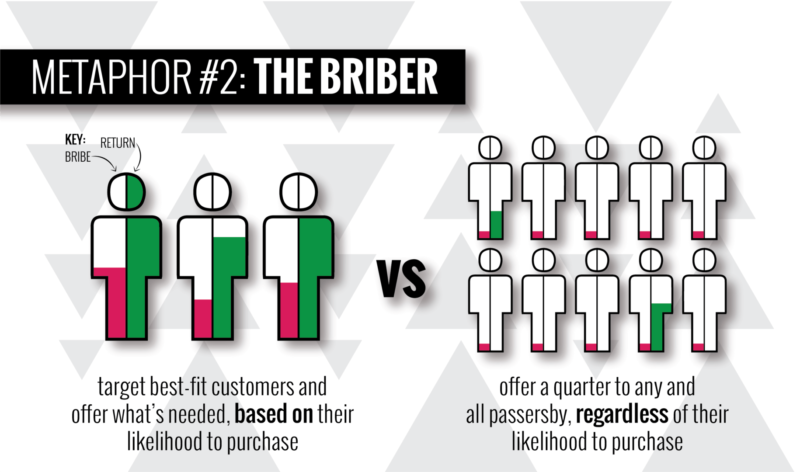Understanding Auction Dynamics: Why More Traffic Can Mean Less Revenue
What's the relationship between traffic and revenue in SEM? Columnist George Michie explains.
Auction-based advertising models force important trade-offs between traffic volumes and revenue for fixed-budget advertisers. Today, we’re going walk through why that is and how that fact confuses many marketers who primarily buy fixed-price media placements.
Put on your fixed-price advertising hat for a moment and think about this: what do you expect to get from a $5,000 TV ad buy, or print ad or circular? You want that ad to create awareness, get people into your stores (online or off) and ultimately, generate revenue.
The more qualified prospective customers the ad reaches, the better. The more traffic generated, the better. The more revenue generated, the better. You paid a flat price for the media placement, so the more eyeballs, traffic and revenue you get from it, the happier you are with the performance.
There is no tension whatsoever when you set goals for fixed media that include reach, traffic and revenue. As always, those goals may or may not be realistic, but they are not inherently in conflict with each other.
Now, consider what happens when the ad-buying model flips to an auction for individual prospective customers. With the same $5,000 to spend, maximizing visibility and traffic requires the marketer to buy prospective customers at the lowest possible price.
On the surface, that seems like a good plan. The problem is — assuming the marketplace is rational — the quality of the prospects declines with the price. You get what you pay for; and since you’re buying the dregs, you’re likely going to hurt your revenue.
Metaphor #1: The Estate Sale
You go to an estate sale with $5K to spend and instructions to get the largest number of items you can get for that. Your strategy has to be to only bid on the cheapest stuff that few other shoppers want. Maybe there’s a hidden treasure, but more likely, you get a pile of junk.
A much more lucrative approach is to try to maximize the value differential between what you have to pay to win each auction and what the items are worth. That may include some of the inexpensive stuff, but may also include some of the higher-ticket items.
Maximizing the arbitrage value results in much better return on spend, but may also result in only walking away with a few items.
Metaphor #2: The Briber
You have a store at the mall and you want to get people into the store. You hire a guy named Bob to spend $5K bribing people to visit your store and tell him that you want as many people as he can get for that $5K.
Bob will therefore look to see who he can get to visit the store for the least amount of money per person. What kind of traffic will you get if Bob offers a quarter for anyone who goes into the store? You’ll likely get thousands and thousands of panhandlers wandering through the aisles along with the folks who were planning to go into the store anyway.
(Sidebar: To keep Bob from wasting money on customers who were walking into your store anyway, you’d be wise to only credit him with traffic over and above the expected foot traffic for the day. Bob would then have an incentive to use the money to attract people who weren’t walking in the front door already {like Brand traffic in search}. However, getting a few more vagrants for your $5K is hardly going to help your revenue for the day.)
The problem is, quality incremental customers aren’t likely to go out of their way for a quarter. Instead of head count, it would be better tell Bob to target people most likely to buy something, paying each person whatever he thinks will make sense based on how likely they are to purchase and what they’re likely to spend if they buy something.
Heck, if Bob saw Oprah Winfrey walking through the mall he might be smart to offer her the whole $5K to swing by; she doesn’t need the money, but might be charmed by the offer and take a walk-through as a lark!
Indeed, if Bob is really good at what he does — he can spot incremental buyers well and gauge accurately what he can afford to pay for them to come in — then why would you give him a fixed budget? Why not tell Bob, “Keep spending money as long as you can bring in traffic that is more valuable than it costs”?
Similarly, in the Estate Auction metaphor, wouldn’t a wise investor instruct her/his assistant to spend as much or as little as makes sense based on the difference between the value of the item and the auction price?
Search marketing should be like having a really smart Bob. When the value of traffic is highly variable and the tools to measure value are very accurate, giving Bob the flexibility to spend money judiciously is far better than asking Bob to buy cheap traffic.
If traffic metrics remain important for brand awareness, by all means create a budget for driving awareness, but make it a separate budget. Don’t sacrifice profitable revenue by taking money for traffic generation out of what could be spent on high-quality, high-value traffic.
Opinions expressed in this article are those of the guest author and not necessarily Search Engine Land. Staff authors are listed here.
Related stories


